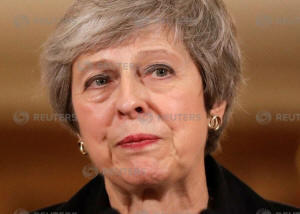|
UK PM May battles to sell Brexit deal
amid rumors of no-confidence vote
 Send a link to a friend
Send a link to a friend
 [November 16, 2018]
By Guy Faulconbridge and Costas Pitas [November 16, 2018]
By Guy Faulconbridge and Costas Pitas
LONDON (Reuters) - British Prime Minister
Theresa May was fighting for survival on Friday after a draft divorce
deal with the European Union provoked the resignations of senior
ministers and calls for a vote of no confidence in her leadership.
More than two years after the United Kingdom voted to leave the EU, it
is still unclear how, on what terms or even if it will leave the EU as
planned on March 29, 2019.
May, who won the top job in the turmoil that followed the 2016
referendum, has sought to negotiate a Brexit deal ensuring the United
Kingdom leaves in the smoothest way possible.
But Brexit minister Dominic Raab resigned on Thursday over her deal,
sending the pound tumbling. Mutinous lawmakers in her own party openly
sought to challenge her leadership and bluntly told her that the Brexit
deal would not pass parliament.
May, who has vowed to stay on as prime minister, was asked by a caller
on LBC radio to "respectfully stand down". She did not immediately
address that part of the caller's question.
British media have been awash with rumors that May would face an
imminent vote of no confidence in her leadership from her own
Conservative Party lawmakers.
When 48 Conservatives submit letters to the party's so-called 1922
committee, May will face a confidence vote, needing a simple majority of
the total votes in order to win.

"For the sake of the Conservative Party and indeed for our country's
destiny, I honestly believe that (it) is now time to seek fresh
leadership that can carry this country forward outside of the European
Union," Brexit-supporting lawmaker Mark Francois wrote in a letter
headlined "She Just Doesn't Listen".
However in a boost to May, Michael Gove, 51, the most prominent Brexit-supporting
minister in her government, gave his backing to the prime minister,
saying he would stay on in government as environment minister.
Asked if he had confidence in May, Gove, who torpedoed former foreign
minister Boris Johnson's leadership bid in 2016, told reporters: "I
absolutely do."
"I think it's absolutely vital that we focus on getting the right deal
in the future, and making sure that in the areas that matter so much to
the British people we can get a good outcome."
Other eurosceptic ministers also agreed to stay, according to a tweet
from Tim Shipman, Sunday Times political editor.
"RESIGNING WILL NOT HELP"
"Resigning and joining a rebellion is not going to help anything," he
quoted an unnamed source as saying.
Sterling, which has see-sawed on Brexit news since the referendum, was
flat at $1.2783 on Friday, down almost three cents since a deal was
struck on Tuesday.
Brexit will pitch the world's fifth largest economy into the unknown.
Many fear it will divide the West as it grapples with both the
unconventional U.S. presidency of Donald Trump and growing assertiveness
from Russia and China.
Jo Johnson, who resigned as a minister last week, said the situation
marked the worst failure of statesmanship since the 1956 Suez canal
crisis, when Britain was forced by the United States to withdraw its
troops from Egypt.
Amid the turmoil the ultimate outcome remains uncertain.
Scenarios include May's deal ultimately winning approval; May losing her
job; Britain leaving the bloc with no agreement; or even another
referendum.
[to top of second column]
|

Britain's Prime Minister Theresa May holds a news conference at
Downing Street in London, Britain November 15, 2018. Matt
Dunham/Pool via Reuters

To leave the EU on the terms of her deal, May would need to get the
backing of about 320 of parliament's 650 lawmakers. The deal is due
to be discussed at an EU summit on Nov. 25.
Politicians, officials and diplomats in London openly questioned how
long May had left as speculation swirled around London that a
leadership challenge could come soon.
By seeking to preserve the closest possible ties with the EU, May
has upset her party's many advocates of a clean break, and Northern
Ireland's Democratic Unionist Party (DUP), which props up her
minority government.
The Daily Telegraph newspaper reported that the DUP had demanded May
be replaced as prime minister.
"Oh I haven't had a testy exchange with Arlene," May said. "They've
raised some questions with us, they've raised some concerns with us
and yes we are looking at those.
"We are still working with the DUP," she said.
NIGHTMARE FOR BUSINESS?
The EU and Britain need an agreement to keep trade flowing between
the world's biggest trading bloc and the United Kingdom, home to the
biggest international financial center.
May said she felt the threat of a no deal Brexit personally as she
was Type 1 diabetic: "I depend on insulin every day. My insulin is
produced by a country elsewhere in the European Union."
May's spokeswoman said there had been strong support from the
country's business community for her draft deal but British
aero-engine maker Rolls-Royce <RR.L> said it was continuing with its
no-deal contingency plans.
The plans include "buffer stocks so that we have all the logistical
capacity that we need to carry on running our business," said Chief
Executive Warren East.

Proponents of closer relations with the EU in her own party and the
Labour opposition say the deal squanders the advantages of
membership for little gain.
Supporters of Brexit say that while the divorce might bring some
short-term instability, in the longer term it will allow the United
Kingdom to thrive.
(Additional reporting by Andrew MacAskill, Andy Bruce and Alistair
Smout; writing by Michael Holden and Guy Faulconbridge. Editing by
Matthew Mpoke Bigg, William Maclean)
[© 2018 Thomson Reuters. All rights
reserved.]
Copyright 2018 Reuters. All rights reserved. This material may not be published,
broadcast, rewritten or redistributed.
Thompson Reuters is solely responsible for this content. |